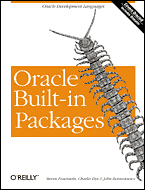

Oracle PL/SQL Oracle Built-in
Programming Packages
PL/SQL Programming Log
Sample Templates
Bibliography
Although I purchased PL/SQL Programming online over a month ago, I only began reading it a few days ago. I'm up to Chapter 6 now, on Database Interaction and Cursors. I puchased Oracle Built-in Packages earlier this morning. It is my goal to complete my first reading of the former before this latter book is delivered
I have already written a few templates - skeletons, if you will, for future programs.
package_template.txt
for packages
cursor_template.txt for
cursors
cursor_var_template.txt for
cursor variables
Finished up through Chapter 7, on Loops.
cursor_for_loop_template.txt for cusrsor FOR loops (among Feurstein's favorite PL/SQL features, and I see why)
package_template.txt
for packages (ch. 3)
cursor_template.txt for
cursors (ch. 6)
cursor_var_template.txt for
cursor variables (ch. 6)
cursor_for_loop_template.txt
for cusrsor FOR loops (ch. 7)
PACKAGE
/*
|| Author: John K. Joachim
||
|| Overview:
||
|| Major Modifications:
|| Date:
||
*/
IS
/* -------------- Modules to define the list -----------------*/
/* -------------- Modules to manage Item Selections ----- */
/* -------------- Package Variables -----------------------------
*/
/*... declarations placed here ...*/
/* -------------- Private Modules -------------------------------
*/
/* FUNCTION... */
/* PROCEDURE ...*/
/* -------------- Public Modules --------------------------------
*/
/* FUNCTION... */
/* PROCEDURE ...*/
END
cursor_template.txt
DECLARE
/*
|| Author: John K. Joachim
|| Telamon Corporation
|| Overview: ________ Cursor
||
|| Major Modifications:
|| Date:
||
*/
CURSOR cursor_name IS
SELECT .... FROM ;
[record] cursor_name%ROWTYPE;
BEGIN
/* Open only if cursor is not yet
open */
IF NOT cursor_name%ISOPEN
THEN
OPEN cursor_name;
END IF;
FETCH cursor_name INTO [record] ;
/* Keep fetching until no more
records are FOUND */
WHILE cursor_name%FOUND
LOOP
DBMS_OUTPUT.PUT_LINE
('Just fetched record number ' ||
TO_CAHR (cursor_name%ROWCOUNT));
FETCH cursor_name INTO ...... ;
END LOOP;
CLOSE cursor_name;
END;
DECLARE
/* Create the
cursor type. */
TYPE company_curtype
IS REF CURSOR RETURNcompany%ROWTYPE;
/* Decalre a cursor variable
of that type */
company_curvar company_curtype;
/* Declare a record with
same structure as cursor variable. */
company_rec company%ROWTYPE;
BEGIN
/* Open the cursor variable,
associating with it a SQL statement. */
OPEN company_curvar FOR SELECT
* FROM company;
/* Fetch from the cursor
variable. */
FETCH company_cuvar INTO company_rec;
/* Close the cursor object
associated with variable. */
CLOSE company_curvar;
END;
DECLARE
CURSOR _CUR
/*
|| Author: John K. Joachim
||
|| Overview:
||
|| Major Modifications:
|| Date:
||
*/
is
SELECT ......
FROM
WHERE
_rec _cur%ROWTYPE;
BEGIN
OPEN _cur;
LOOP
FETCH _cur INTO _rec;
EXIT WHEN _cur%NOTFOUND;
update_
( _rec._,
_rec._);
END LOOP;
CLOSE _cur;
END;
The following log was established to keep
the notes I have from treading the following 2 books by Steven Feuerstrin:


Oracle
PL/SQL
Oracle Built-in
Programming
Packages
The purpose of reading these two books is to prepare for the first of five exams in Oracle's OCP certification track. It is my belief that studing these two books will not only prepare me for this exam, but will also help me retain what I learn (also a purpose of this build log).
Other books I have purchased which I suspect will also be helpful, and will be referenced occasionally in this log:



Oracle 8i Internals
Oracle Design
Oracle SQL*Plus:
for Waits, Latches,
The Definitive Guide
Locks, and Memory